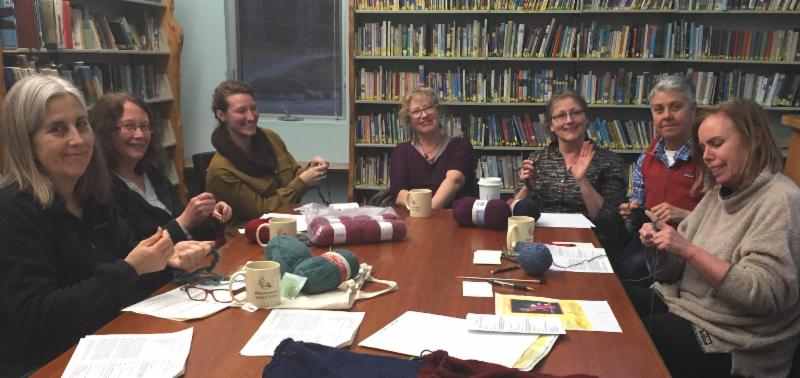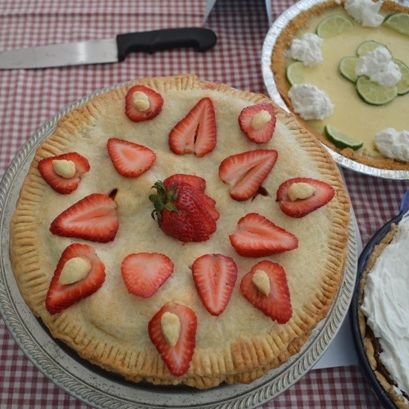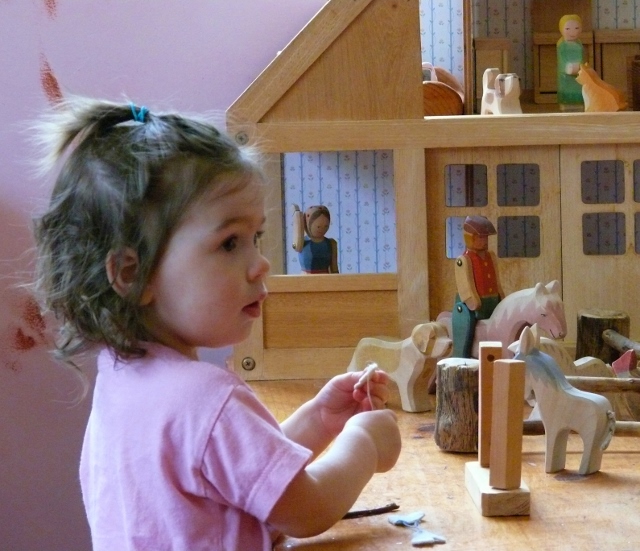How do we work with children (and ourselves) to meet the challenge of our anxious times? This article by Andrew Gilligan and Beth Riungu of MWS offers reflections from Kim John Payne’s recent visit to the school.
At the Northeast AWSNA Conference, Kim John Payne addressed a crowd of almost 200 parents and educators who attended from as far afield as Quebec, northern Vermont and western Massachusetts. They had come to hear about the approach Kim uses to address childhood anxiety. He began his talk by telling us the premise of all his work with children: that he sees the same trauma in the children of wealthy families in America and England that he saw in children living in war-torn refugee camps. More than presenting a startling account of the war against childhood unknowingly being waged by well-meaning, intelligent, upstanding adults, he offered help.
Kim shared an anecdote about overhearing fathers in Brooklyn as they picked their kids up from school, calling their kids buddy, dude, and bro, as if there was a collective amnesia of their roles as fathers and adults. Perhaps there is an overabundance of Peter Pans parenting in Brooklyn. However, even though I live in Rockville, Rhode Island, I still find myself calling my son buddy from time to time, like my dad called me in Littleton, Colorado. I’m easily reminded that my son is not my actual buddy because he’s 8 months old and I would never tell a friend not to play with a lamp cord if they wanted to play with one.
 It becomes more difficult to make these choices for a child once they learn to talk and explain why they want to play with a lamp cord. It’s easy, sometimes, to forget you’re an adult and that young children need adults to make choices, authoritative choices without discussion or reference to an article on parenting. If you ask a five-year-old, ‘what do you want to do?’ every day, or present them with a continual array of choices, they’re bound to be anxious. Ditto for a 9-year old. Kim tried to help us realize that adults are not on an epic play date with their child. The loving adult that takes a decisive role that he calls the Governor gives the child a feeling that the world is good. It gives them a bedrock of will to stand on for the rest of their lives.
It becomes more difficult to make these choices for a child once they learn to talk and explain why they want to play with a lamp cord. It’s easy, sometimes, to forget you’re an adult and that young children need adults to make choices, authoritative choices without discussion or reference to an article on parenting. If you ask a five-year-old, ‘what do you want to do?’ every day, or present them with a continual array of choices, they’re bound to be anxious. Ditto for a 9-year old. Kim tried to help us realize that adults are not on an epic play date with their child. The loving adult that takes a decisive role that he calls the Governor gives the child a feeling that the world is good. It gives them a bedrock of will to stand on for the rest of their lives.
Healthful attitudes towards the child at the different stages of their life help to alleviate anxiety, both the child’s and the parent’s. Once a child is moving towards the tween years, between the ages of 7 and 14, Kim recommended the adult relinquish little by little their role as Governor and shift towards a different role he calls, the Gardener. The Gardener who watches, listens, is responsive to their child’s needs and nurtures healthy growth as if tending an orchard. The world is beautiful at this age, but the child is still not a buddy and it is still the adult that ultimately decides what is needed.
 After the age of 14, as teenagers become more mature and not necessarily just older, Kim recommended that a parent gradually become more like a guide, or collaborator. At this stage the teenager seems more akin to lions, and tigers, and bears – oh my! They want to know what is true in the world and concoct grand visions for themselves. The role of the adult is to help the teenager create the plan they need to realize their dreams. The conversation would be more like, ‘What do you want to do? Okay, I’ll drive you there and drop you off’. Although the child increasingly decides on their course of action, they still need the adult to be an authority in their life rather than a peer.
After the age of 14, as teenagers become more mature and not necessarily just older, Kim recommended that a parent gradually become more like a guide, or collaborator. At this stage the teenager seems more akin to lions, and tigers, and bears – oh my! They want to know what is true in the world and concoct grand visions for themselves. The role of the adult is to help the teenager create the plan they need to realize their dreams. The conversation would be more like, ‘What do you want to do? Okay, I’ll drive you there and drop you off’. Although the child increasingly decides on their course of action, they still need the adult to be an authority in their life rather than a peer.
Kim used beautiful watercolor paintings by his wife, Katharine Payne, to describe these stages of child development. They illustrated a journey from the garden where the young child plays in the mud, through a sheltering forest where they play with friends, and up the rocky slope to the mountaintop from where they can see all of the world laid out below them. Kim warned against societal pressures that subject the child to ‘too much, too soon, too sexy’. The young child can’t withstand the chill of the bare mountain top. Before around age seven, the child will lose their way among the shadows of the forest. Children need to make this journey at their own pace if they are to build the resilience needed to sustain themselves in the face of the challenges and anxieties of life.
To this image, Kim added a spatial picture. It consists of four concentric circles or realms. The outer circle is a child’s relationship with the natural world. The next is their relationship with their friends. The next, with family. The most intimate realm being that of a child’s relationship to their self. The important thing to remember about these realms is that each of them takes time to develop. A child must spend copious amounts of time in nature to develop a feeling of kinship with plants, animals, stones, wind, sun, clouds. They have to play with other people to make friends and it takes time to develop the defining aspect of friendship; trust. It takes time to build their relationship with their family, and with their self. Relationships take time.
 Yet how much time each day does a child have to freely engage with these four realms? Kim said that, given time, a sheath can be created from a balance of the inner and outer worlds of a child that protects them, like their spiritual skin. The inner world is cultivated through creative play, projects, time with family, and time in nature. While the outer world is composed of homework, sports, screens, play dates, etc. When the balance is broken, anxiety results. Kim warned us that the level of anxiety experienced by present day humanity is unsustainable and we need to protect our children from it.
Yet how much time each day does a child have to freely engage with these four realms? Kim said that, given time, a sheath can be created from a balance of the inner and outer worlds of a child that protects them, like their spiritual skin. The inner world is cultivated through creative play, projects, time with family, and time in nature. While the outer world is composed of homework, sports, screens, play dates, etc. When the balance is broken, anxiety results. Kim warned us that the level of anxiety experienced by present day humanity is unsustainable and we need to protect our children from it.
To do this we must curb our own anxiety as adults. He gave the Olympic sport of Curling as a great example of anxious parenting. Parents, frantically polishing the path ahead of their child to help them to glide as smoothly and as quickly as possible to the finish line. This is exhausting and ill-advised work. Our children need experiences that challenge them. Not prefabricated commercial products with 100% guaranteed results. Not an easy ride. Children must have experiences of overcoming the obstacles of life for themselves and, at times, failing.
Kim John Payne did not offer a package of rules, regulations, and procedures to practice in order to decrease childhood anxiety. He offered guideposts and helping advice. He called on adults to strengthen their own inner lives for the sake of their children. Above all, called on us to give children time to connect to the essential reality of life. In this present-day world of pre-packaged fantasy, virtual reality and artificial intelligence, we must let the children play, imagine and create in the real world. Resilience built there will protect the child into a future none of us can see. In the end, Kim said, I’m not anti anything. I’m just pro connection.

 Come as a newbie to learn to carve your own spoon, bring a project to finish or talk with Ken about starting something new! This different type of wood working is very basic and done by hand using small axes and knives. Help form a community of spoon carvers.
Come as a newbie to learn to carve your own spoon, bring a project to finish or talk with Ken about starting something new! This different type of wood working is very basic and done by hand using small axes and knives. Help form a community of spoon carvers. Bring the project you are working on and meet other knitters. This group meets at the Kingston Library, upstairs in the Potter Room. Amy Rippe is a Faculty Mentor at MWS and former class teacher.
Bring the project you are working on and meet other knitters. This group meets at the Kingston Library, upstairs in the Potter Room. Amy Rippe is a Faculty Mentor at MWS and former class teacher. Come learn how to make a delicious pie crust. We will share a slice of pie and tea, and you will leave with a pie ready to bake at home!
Come learn how to make a delicious pie crust. We will share a slice of pie and tea, and you will leave with a pie ready to bake at home! Learn to felt a Spring fairy and go home with a beautiful addition to your family. Julia Scherer leads the MWS Parent Child Group and also is an Early Childhood assistant.
Learn to felt a Spring fairy and go home with a beautiful addition to your family. Julia Scherer leads the MWS Parent Child Group and also is an Early Childhood assistant. This gathering is for parents of young children. Enjoy a morning of tea, conversation, and fellowship. Children under 1 year are welcomed with their parents. Jane Francis is a MWS Early Childhood teacher and Linda Beal is a MWS parent alum and former teacher.
This gathering is for parents of young children. Enjoy a morning of tea, conversation, and fellowship. Children under 1 year are welcomed with their parents. Jane Francis is a MWS Early Childhood teacher and Linda Beal is a MWS parent alum and former teacher. This class with MWS alum Sam Dufresne will cover survival preparedness and culminates with a day hike on a date to be determined.
This class with MWS alum Sam Dufresne will cover survival preparedness and culminates with a day hike on a date to be determined. Map your life through the evolutionary cycles of the human being based on Steiner’s biography work. Susan is a MWS alumni parent, former CEO and founder of Dr. Hauschka USA and leads workshops at the Center for Biography and Social Arts.
Map your life through the evolutionary cycles of the human being based on Steiner’s biography work. Susan is a MWS alumni parent, former CEO and founder of Dr. Hauschka USA and leads workshops at the Center for Biography and Social Arts.
 It becomes more difficult to make these choices for a child once they learn to talk and explain why they want to play with a lamp cord. It’s easy, sometimes, to forget you’re an adult and that young children need adults to make choices, authoritative choices without discussion or reference to an article on parenting. If you ask a five-year-old, ‘what do you want to do?’ every day, or present them with a continual array of choices, they’re bound to be anxious. Ditto for a 9-year old. Kim tried to help us realize that adults are not on an epic play date with their child. The loving adult that takes a decisive role that he calls the Governor gives the child a feeling that the world is good. It gives them a bedrock of will to stand on for the rest of their lives.
It becomes more difficult to make these choices for a child once they learn to talk and explain why they want to play with a lamp cord. It’s easy, sometimes, to forget you’re an adult and that young children need adults to make choices, authoritative choices without discussion or reference to an article on parenting. If you ask a five-year-old, ‘what do you want to do?’ every day, or present them with a continual array of choices, they’re bound to be anxious. Ditto for a 9-year old. Kim tried to help us realize that adults are not on an epic play date with their child. The loving adult that takes a decisive role that he calls the Governor gives the child a feeling that the world is good. It gives them a bedrock of will to stand on for the rest of their lives. After the age of 14, as teenagers become more mature and not necessarily just older, Kim recommended that a parent gradually become more like a guide, or collaborator. At this stage the teenager seems more akin to lions, and tigers, and bears – oh my! They want to know what is true in the world and concoct grand visions for themselves. The role of the adult is to help the teenager create the plan they need to realize their dreams. The conversation would be more like, ‘What do you want to do? Okay, I’ll drive you there and drop you off’. Although the child increasingly decides on their course of action, they still need the adult to be an authority in their life rather than a peer.
After the age of 14, as teenagers become more mature and not necessarily just older, Kim recommended that a parent gradually become more like a guide, or collaborator. At this stage the teenager seems more akin to lions, and tigers, and bears – oh my! They want to know what is true in the world and concoct grand visions for themselves. The role of the adult is to help the teenager create the plan they need to realize their dreams. The conversation would be more like, ‘What do you want to do? Okay, I’ll drive you there and drop you off’. Although the child increasingly decides on their course of action, they still need the adult to be an authority in their life rather than a peer. Yet how much time each day does a child have to freely engage with these four realms? Kim said that, given time, a sheath can be created from a balance of the inner and outer worlds of a child that protects them, like their spiritual skin. The inner world is cultivated through creative play, projects, time with family, and time in nature. While the outer world is composed of homework, sports, screens, play dates, etc. When the balance is broken, anxiety results. Kim warned us that the level of anxiety experienced by present day humanity is unsustainable and we need to protect our children from it.
Yet how much time each day does a child have to freely engage with these four realms? Kim said that, given time, a sheath can be created from a balance of the inner and outer worlds of a child that protects them, like their spiritual skin. The inner world is cultivated through creative play, projects, time with family, and time in nature. While the outer world is composed of homework, sports, screens, play dates, etc. When the balance is broken, anxiety results. Kim warned us that the level of anxiety experienced by present day humanity is unsustainable and we need to protect our children from it.

 This workshop will present parents, faculty, and staff with information that will transform the way they think about and respond to anxiety in children and adolescents. Information on recognizing anxiety disorders in youth as well as tips and techniques for responding to anxiety will be presented. Come and learn what research-supported approaches to behavior change you can begin applying immediately to provide children and adolescents with the skills to deal effectively with the challenges of everyday life.
This workshop will present parents, faculty, and staff with information that will transform the way they think about and respond to anxiety in children and adolescents. Information on recognizing anxiety disorders in youth as well as tips and techniques for responding to anxiety will be presented. Come and learn what research-supported approaches to behavior change you can begin applying immediately to provide children and adolescents with the skills to deal effectively with the challenges of everyday life.
 Connect on Facebook
Connect on Facebook E-mail the School
E-mail the School